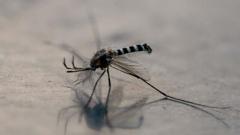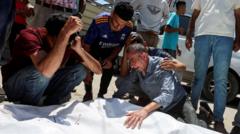Colombia's health ministry has declared a national emergency as at least 34 cases of yellow fever-related deaths have been reported, urging vaccinations for those traveling.
Colombia Faces Yellow Fever Crisis as Death Toll Rises

Colombia Faces Yellow Fever Crisis as Death Toll Rises
Nationwide health emergency declared following alarming surge in yellow fever fatalities
Colombia has declared a nationwide health emergency in the wake of a troubling escalation of yellow fever cases, with official figures confirming at least 34 deaths attributed to the virus. This outbreak, primarily spread by infected mosquitoes, has prompted the government to emphasize the importance of vaccination, particularly as the Easter weekend approaches—a time when many Colombians travel to warmer, higher-risk areas where these mosquitoes are prevalent.
Health Minister Guillermo Alfonso Jaramillo reported that there have been 74 confirmed cases of yellow fever during this outbreak, vastly exceeding the few cases recorded in recent years—only two reported in 2023 and none from 2019 to 2022. The current outbreak has demonstrated a stark mortality rate of nearly 50% among infected individuals. Notably, the majority of cases have been concentrated in the eastern regions of Tolima province, an area renowned for its coffee production and scenic beauty, attracting numerous tourists each year.
President Gustavo Petro took to social media, cautioning that unvaccinated individuals should refrain from visiting high-risk areas, specifically highlighting the coffee region during Easter. Given yellow fever’s varied symptoms—which can easily mimic other illnesses—early diagnosis can be challenging. The World Health Organization (WHO) indicates that while many recover following an initial phase featuring fever and muscle pain, approximately 15% progress to a more severe second phase, which can lead to high mortality rates.
To combat the crisis, the Colombian government is offering vaccines at no charge, urging citizens to take preventive measures as the threat of yellow fever looms larger in the coming weeks.
Health Minister Guillermo Alfonso Jaramillo reported that there have been 74 confirmed cases of yellow fever during this outbreak, vastly exceeding the few cases recorded in recent years—only two reported in 2023 and none from 2019 to 2022. The current outbreak has demonstrated a stark mortality rate of nearly 50% among infected individuals. Notably, the majority of cases have been concentrated in the eastern regions of Tolima province, an area renowned for its coffee production and scenic beauty, attracting numerous tourists each year.
President Gustavo Petro took to social media, cautioning that unvaccinated individuals should refrain from visiting high-risk areas, specifically highlighting the coffee region during Easter. Given yellow fever’s varied symptoms—which can easily mimic other illnesses—early diagnosis can be challenging. The World Health Organization (WHO) indicates that while many recover following an initial phase featuring fever and muscle pain, approximately 15% progress to a more severe second phase, which can lead to high mortality rates.
To combat the crisis, the Colombian government is offering vaccines at no charge, urging citizens to take preventive measures as the threat of yellow fever looms larger in the coming weeks.

















